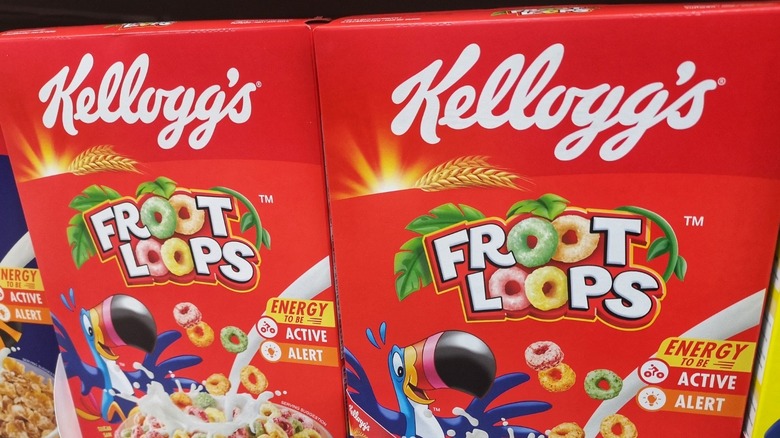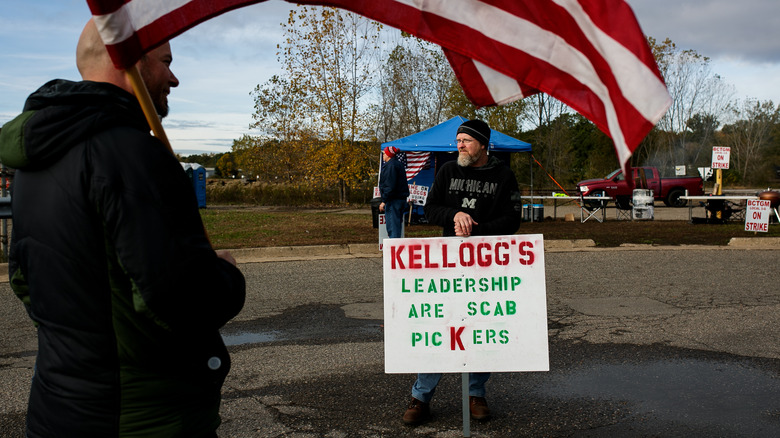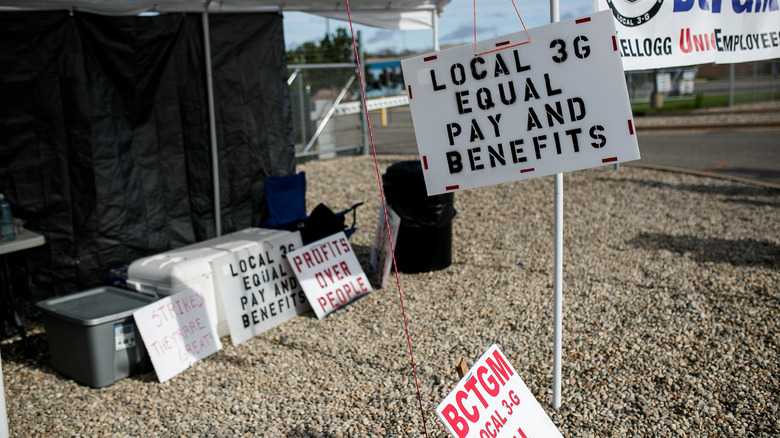The Kellogg Worker Strike Just Took A Huge Turn
Approximately 1,400 unionized workers at Kellogg Company have been on strike since October 5, 2021, as reported by Associated Press. The result of a breakdown in over a year's worth of contract negotiations, the organized worker strike impacted many of Kellogg's U.S. plants, which produce Frosted Flakes, Fruit Loops, Pop Tarts, and many other American breakfast staples.
Per Reuters, the union and the company were attempting to finalize a new contract, but couldn't come to terms over salaries and benefits. According to Anthony Shelton, president of Bakery, Confectionery, Tobacco Workers and Grain Millers International Union, Kellogg allegedly wanted some of its employees to compromise on heath care, retirement packages, and paid leave. On the other hand, Kellogg stated that it was offering a fair contract to its workers. A statement from the company read, "We are disappointed by the union's decision to strike...our offer includes increases to pay and benefits for our employees."
As pointed out by NBC News, this strike was also linked to a growing problem across several industries: a "two-tier benefit and wage system" that also motivated worker strikes at Nabisco, John Deere, Kaiser Permanente, and more. The two-tier system sets up two separate structures at organizations in terms of salaries and benefits, or as NBC News describes it, "for the length of a given contract, existing workers are grandfathered in and guaranteed certain benefits and pay rates, while future employees are hired at a lower pay rate and often receive fewer or worse benefits." The controversial practice has sparked backlash with employees in both tiers.
The Kellogg worker strike is a complicated problem
Per NBC News, the two-tier system came into place in 2015 at The Kellogg Company when employees agreed to a temporary arrangement that included "tight caps for how many workers could be considered transitional versus legacy." This October, the company's employees said that the organization was attempting to implement the system for good. Kellogg refuted this point, with a spokesperson saying, "The union agreed to a two-tiered system in 2015 to help address rising labor costs, which were out of sync with the market and the rest of our network." They added that hourly cereal employees received a $15,000 signing bonus "in exchange for these changes" and that the union is now ignoring this deal.
Per The New York Times, if the company's workers had said yes to the new suggestions from Kellogg, all workers who have spent four years or more at the company would be classified as "legacy" workers and receive the commensurate pay and benefits. The company's suggestions indicated that lower tier, known as "transitional" workers would have "an accelerated, defined path...to legacy wages and benefits."
However, union workers remain unconvinced. Local union vice president Kevin Bradshaw at the company's Memphis plant told USA Today, "The majority [of the workers] said they didn't like it [the proposed contract.] It's the only issue that matters." Per Reuters, the employees believe that the new plan would hurt the union and its influence by "removing the cap on the number of lower-tier employees" which could potentially hurt the legacy workers if transitional employees obtained a majority and began negotiating against legacy wages.
Replacements are being hired
The Kellogg company has now made the decision to hire more people in a bid to replace some of its employees who have refused to back down from the strike. According to Reuters, the company brought in temporary workers after the strikes began in October and the workers' contracts came to an end. But now, it has made its stance clear: it will get permanent replacements instead.
Via press release, Kellogg North America President Chris Hood said that the company had attempted to hold 19 discussions during the negotiation period with the union in 2021. The company now wants to turn to its "contingency plan" and find replacements. Hood said, "While certainly not the result we had hoped for, we must take the necessary steps to ensure business continuity." He added that the company needed to keep its customers happy and meet their expectations. Local union vice president Kevin Bradshaw responded critically to the company's decision to hire permanent replacements, telling USA Today, "They can't hire enough people in one plant, let alone 1,400."
Meanwhile, a statement from the Bakery, Confectionery, Tobacco Workers and Grain Millers International Union read that the strike is still in place and that the team is grateful for all the support that it has gotten from its peers. It added that it will continue to work alongside the striking workers.


